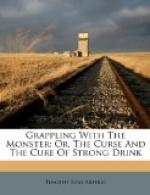Now, if it can be shown that the liquor traffic is a good thing; that it benefits the people; makes them more prosperous and happy; improves their health; promotes education and encourages virtue, then its right to exist in the community has been established. Or, even if the good claimed for it be only negative instead, of positive, its right must still be unquestioned. But what if it works evil and only evil in the State? What if it blights and curses every neighborhood, and town, and city, and nation in which it exists; laying heavy taxes upon the people that it may live and flourish, crippling all industries; corrupting the morals of the people; enticing the young from virtue; filling jails, and poor-houses, and asylums with a great army of criminals, paupers and insane men and women, yearly extinguishing the light in thousands of happy homes? What then?
Does this fruit of the liquor traffic establish its right to existence and to the protection of law? Let the reader answer the question for himself. That it entails all of these evils, and many more, upon the community, cannot and will not be denied. That it does any good, cannot be shown. Fairly, then, it has no right to existence in any government established for the good of the people; and in suppressing it, no wrong can be done.
PROHIBITION NOT UNCONSTITUTIONAL.
How the question of prohibition is regarded by the highest legal authority in the United States will appear from the following opinions officially given by four of the Justices of our Supreme Court. They are expressed in no doubtful or hesitating form of speech:
Chief Justice Taney said: “If any State deems the retail and internal traffic in ardent spirits injurious to its citizens, and calculated to produce idleness, vice or debauchery, I see nothing in the Constitution of the United States to prevent it from regulating or restraining the traffic, or from prohibiting it altogether, if it thinks proper.”—[5 Howard, 577.]
Hon. Justice McLean said: “A license to sell is a matter of police and revenue within the power of the State.”—[5 Ibid., 589.] “If the foreign article be injurious to the health and morals of the community, a State may prohibit the sale of it.”
Hon. Justice Catron said: “If the State has the power of restraint by license to any extent, she may go to the length of prohibiting sales altogether.”—[5 Ibid., 611.]
Hon. Justice Grier said: “It is not necessary to array the appalling statistics of misery, pauperism and crime which have their origin in the use and abuse of ardent spirits. The police power, which is exclusively in the State, is competent to the correction of these great evils, and all measures of restraint or prohibition necessary to effect that purpose are within the scope of that authority.”—[Ibid., 532.]
That the State has a clear right to prohibit the sale of intoxicating drinks, because this sale not only hurts all other interests, but destroys the health and degrades the morals of the people, has been fully shown.




